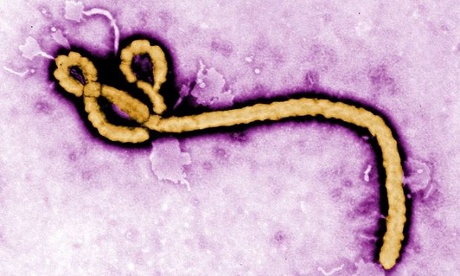 |
| The Ebola Virus. |
Nigerian government has issued a red alert on Ebola virus, the causative agent of Ebola hemorrhagic fever.
In the alert, Nigeria's federal ministry of health is urging individuals with high fever, headache, severe abdominal pain, diarrhea and bleeding to report to the health authorities, especially individuals who had traveled to Guinea, Sierra Leone and/or Liberia.
In a statement issued by the Special Assistant on Media and Communication to the Minister of Health, Mr. Dan Nwome, the health ministry said members of the public should take measures to avert the outbreak or spread of the disease. It added that Nigeria has the capacity to diagnose the disease if it appears here,
Nwome said: "The Nigeria Centre for Disease Control (NCDC) is currently studying the outbreak trends and has mobilised its rapid response teams and developed a detailed response plan that includes a comprehensive health education/health promotion to sensitise Nigerians, enhanced surveillance to detect and treat the disease, while mobilising its treatment/isolation centres. An alert has been issued to all State Commissioners of Health to mobilise against the disease."
He added that the Federal Ministry of Health is working closely with West African Health Organization (WAHO) and the World Health Organization (WHO) and is ready to deploy experts to Guinea on request by the affected country to strengthen its response capacity.
Below is a little information on what Everyone should know about the Ebola Virus:
In a statement issued by the Special Assistant on Media and Communication to the Minister of Health, Mr. Dan Nwome, the health ministry said members of the public should take measures to avert the outbreak or spread of the disease. It added that Nigeria has the capacity to diagnose the disease if it appears here,
Nwome said: "The Nigeria Centre for Disease Control (NCDC) is currently studying the outbreak trends and has mobilised its rapid response teams and developed a detailed response plan that includes a comprehensive health education/health promotion to sensitise Nigerians, enhanced surveillance to detect and treat the disease, while mobilising its treatment/isolation centres. An alert has been issued to all State Commissioners of Health to mobilise against the disease."
He added that the Federal Ministry of Health is working closely with West African Health Organization (WAHO) and the World Health Organization (WHO) and is ready to deploy experts to Guinea on request by the affected country to strengthen its response capacity.
Below is a little information on what Everyone should know about the Ebola Virus:
One of the most virulent viral diseases known to humankind", reads the WHO's alarming first sentence on Ebola, the group of five viruses with a case fatality ranging from 25-90% in humans. Ebola infects humans through direct contact with a sick person's (or animal's) blood or bodily fluids, or through contact with contaminated objects (such as needles and bed sheets). A "viral hemorrhagic fever", symptoms at first resemble those of a normal fever, infections spread quickly among family and friends caring for sick people, and then among medical staff who haven't confirmed the cause of sickness.
Unfortunately, the disease shares early symptoms with any number of other other illnesses, ranging from a passing fever to malaria, cholera and meningitis. Between two and 21 days, infected people might have red eyes and a rash, or suddenly experience "onset of fever, intense weakness, muscle pain and sore throat", "followed by vomiting, diarrhea, rash, impaired kidney and liver function, and in some cases, both internal and external bleeding".
Contagion survives so long as the virus is in people's blood and secretions, and with no vaccine or specialized treatment, victims must simply try to beat the disease with "intensive supportive care" to fight off near constant dehydration. Ebola requires lab tests to confirm, and usually appears around tropical rain forests.
Unfortunately, the disease shares early symptoms with any number of other other illnesses, ranging from a passing fever to malaria, cholera and meningitis. Between two and 21 days, infected people might have red eyes and a rash, or suddenly experience "onset of fever, intense weakness, muscle pain and sore throat", "followed by vomiting, diarrhea, rash, impaired kidney and liver function, and in some cases, both internal and external bleeding".
Contagion survives so long as the virus is in people's blood and secretions, and with no vaccine or specialized treatment, victims must simply try to beat the disease with "intensive supportive care" to fight off near constant dehydration. Ebola requires lab tests to confirm, and usually appears around tropical rain forests.
Please be cautious of your environment, report any of the above signs to the nearest hospital and stay healthy-R101
Just reminded me of MCB 210 I did in my 200L. Ebola virus is sure not the kind Naija should toil with.
ReplyDeleteGood Persoanal Hygiene is a major factor to look at.
am the govt ll do all t takes to protect ts citizenry
ReplyDelete